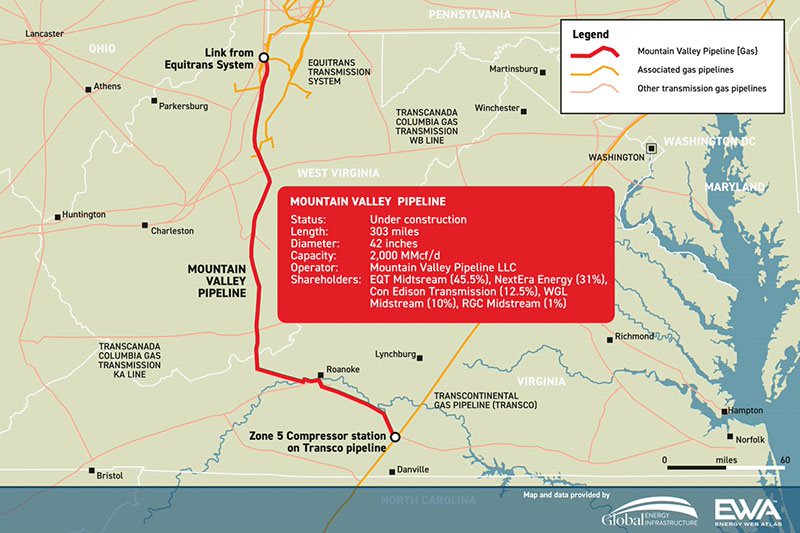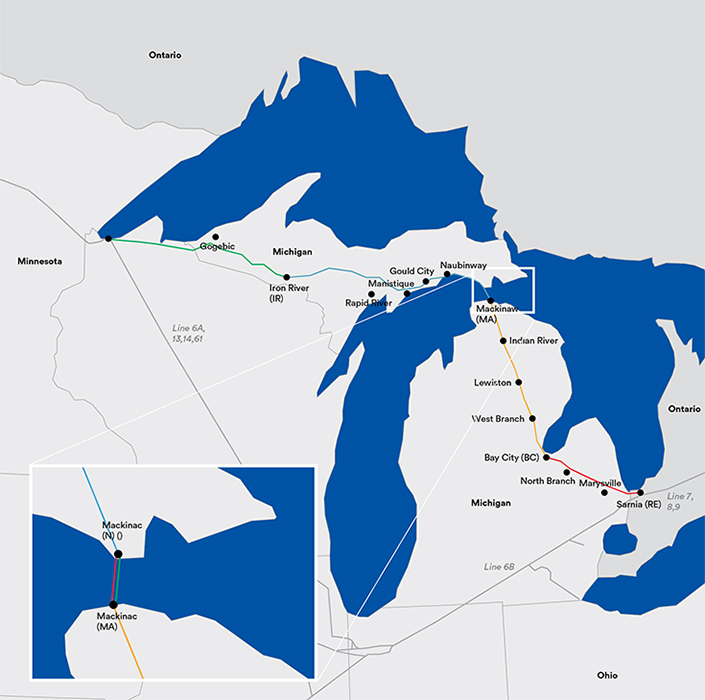May 2023, Vol. 250, No. 5
Projects
Edison to Decide on Mediterranean Gas Pipeline this Year
Mountain Valley Clears Permit Hurdle Involving Review
A federal appeals court threw its support to construction authorizations for the Mountain Valley Pipeline (MVP) project in Virginia, after finding state regulators thoroughly reviewed its environmental impacts.
Despite “assertions to the contrary, there is evidence in the record which indicates the agencies did not simply ‘rubber stamp’ MVP’s proposed crossing methods,” Chief Judge Roger Gregory, of the three-judge panel, wrote.
Environmental groups asked the court in 2021 to disallow the Clean Water Act permit, saying the review failed to take several concerns into sufficient consideration.
In a statement, MVP spokesperson Natalie Cox, of the pipeline’s developer Equitrans Midstream said the decision supported the company’s plan to construct the pipeline “with the least possible impact on the environment.”
Cox said MVP is in the process of obtaining the remaining approvals needed to complete the pipeline.
Separately days later, MVP lost a crucial water permit when a federal appeals court ruled West Virginia didn’t adequately assess the impact of building the pipeline across streams and wetlands.
In its ruling, the court said the state Department of Environmental Protection’s reasoning for granting the water quality certification was “deficient.”
Oil Firms Limit Output in Iraqi Kurdistan After Pipeline Closure
Producers have shut in or reduced output at several oilfields in the semi-autonomous Kurdistan region of northern Iraq following a halt to the northern export pipeline, company statements showed, with more outages on the horizon.
Iraq discontinued 450,000 bpd of crude oil exports from the Kurdistan region through a pipeline from northern Kirkuk oil fields to the port of Ceyhan in Turkey.
Turkey stopped pumping crude from the pipeline after Iraq won an arbitration case that claimed Turkey violated a joint agreement by allowing the Kurdistan Regional Government to export oil to Ceyhan without Baghdad’s consent.
Oil firms operating in the KRI are being forced to halt output or move production into storage, which many say will reach capacity within days, as talks drag between Turkey, Baghdad and the KRG to resume exports.
India-Bangladesh Diesel Pipeline Automated for Monitoring
ABB India has delivered integrated automation and control solutions to for the 81-mile (130-km) Indo-Bangla Friendship Pipeline (IBFPL), which will carry diesel from India to Bangladesh.
The diesel will be transported from NRL’s terminal at Siliguri, to the Bangladesh Petroleum’s oil depot in Parbatipur. About 3.7 miles (6 km) of the pipeline, which is the first of its type between the two countries, will be within the territory of India, with the remainder within the territory of Bangladesh.
With a potential capacity of 1 MMtpa, it will enable Bangladesh to access large volumes of energy to meet its growing domestic demand.
The automated system will allow Numaligarh Refinery Ltd (NRL) to remotely monitor and control pipeline parameters such as flow, pressure and temperature, as well as detect leaks.
ABB India has advanced automation for cross-country projects, including the Indonesua-Nepal petroleum pipeline, which was the first of its kind in South Asia when it opened in 2019.
ATCO Apparently Gives Troubled Pipeline to Mexico
Canada’s ATCO agreed to hand over ownership of an unfinished pipeline to Mexico, after the project stalled over a disagreement with a state power company, according to Reuters, which cited two officials.
The Mexican power utility Comision Federal de Electricidad (CFE) reportedly paid ATCO $100 million in damages, interest and legal fees in 2021 over the Ramal Tula natural gas pipeline in the central state of Hidalgo.
The agreement will release ATCO from liabilities and allow Mexican President Andres Manuel Lopez Obrador to complete the project, designed to deliver natural gas to a power station north of Mexico City.
Three people familiar with the matter said agreement was reached after Lopez Obrador met with Canadian Prime Minister Justin Trudeau in January.
Lopez Obrador afterward met representatives from Canadian energy companies, including ATCO, and details of the transfer were concluded in late February, one of the sources said.
ATCO went to arbitration because after Lopez Obrador took power in 2018, CFE canceled a contract the Calgary-based company made with the last administration to build the pipeline, on the grounds that the work was incomplete, Reuters reported.
Mexico’s previous government had valued the Ramal Tula project at $66 million when the contract was awarded in 2014.
Enbridge’s Line 5 Tunnel Project Faces 18-Month Delay
Enbridge said it is “disappointed” by the decision to extend the permitting process for the proposed Great Lakes Tunnel, which would provide the new housing location for the Line 5 oil pipeline.
Until this recent decision, the U.S. Army Corp of Engineers had planned to publish a draft environmental impact statement on the Line 5 tunnel project in late 2023, but that has pushed back to spring 2025.
Calgary, Canada-based Enbridge said the decision will postpone its plan to replace a section of the existing Line 5 pipeline, which runs underwater for four miles (6.4 km) between Lakes Michigan and Huron. The construction is now expected to take place in 2026.
“While we are supportive of a thorough, comprehensive and carefully considered permitting process that ensures adequate opportunity for review and comment, we are disappointed with the extended timeline for a project of this scope,” Enbridge spokesman Ryan Duffy said.
Enbridge submitted an application to build the tunnel underneath the Straits of Mackinac in 2020. The pipeline carries 540,000 bpd from Superior, Wisconsin, to Sarnia, Ontario.
MOL Group Receives 617,000 Barrels of Crude via Adria Pipeline
MOL Group reached a milestone when it brought home Azeri light crude oil from the ACG field in Azerbaijan by way of the Adria Pipeline.
A Seavelvet tanker shipped 617,000 barrels of crude from the Port of Ceyhan in Turkey to Omisalj in Croatia. The crude was then transported to the Slovnaft Refinery in Slovakia via the Adria Pipeline.
MOL Group said this shipment constitutes well-to-wheel integration of its value chain as it will process and sell petroleum products refined at one of its own refineries using crude oil produced at a field it co-owns. The crude will also be transported from the Sangachal oil terminal near Baku to Ceyhan via the BTC pipeline, also co-owned by MOL Group.
“The capability to supply our refineries with crude sources from outside Europe gives us additional resilience during a period of rapid change,” said Zsombor Marton, executive vice president of exploration and production at MOL Group. “We have the flexibility to decide whether to sell our share of the oil produced at ACG or to bring it to our core region to contribute to the European energy supply security.”
Test production of petroleum products using the Azeri Light will begin in April. This comes after successful testing at Slovnaft Refinery of several types of oils from the Middle East and Caspian region.
This is another important milestone in MOL Group’s journey toward greater crude sourcing flexibility amid European sanctions prohibiting the export of petroleum products from EU member states.
MOL Group hopes to become an increasingly important economic link between Azerbaijan and Central and Eastern Europe. In 2020, the company acquired 9.57% stake in the ACG oilfield, one of the flagship fields of the Azerbaijani economy, and 8.9% in the BTC (Baku-Tbilisi-Ceyhan) pipeline.
Netherlands to Use Existing Pipeline for Hydrogen Facility
The Netherlands is looking to use an existing natural gas pipeline to transport hydrogen to land from a proposed large production facility, targeted to be online in 2031.
The project, which will convert wind power to hydrogen, will be located in the North Sea and have the capacity to produce 500 MW of green hydrogen each year.
If implemented, it would be the first time the Dutch have produced hydrogen at sea on such a large scale. The government hopes to be able to produce 4 GW of hydrogen from renewable sources by 2030.
The new plant would be connected to a wind farm off the coast of the northern province of Groningen, where the hydrogen would be transported to land by using the existing natural gas pipeline.
Edison to Decide on Mediterranean Gas Pipeline this Year
Edison S.p.A plans to make the final investment decision on whether to support a pipeline delivering East Mediterranean gas to European by the end of this year, the Italian project developer told Reuters.
The EastMed-Poseidon pipeline would connect several gas fields offshore Israel to Italy and could be in service by 2027. The pipeline would likely have a capacity of 353 Bcf (10 Bcm) annually.
The project, which would connect Cyprus to its European allies, is backed by Israel, Cyprus and Greece and would guarantee an alternative to Russian supplies to Europe.
For these reasons, the European Commission could be interested in partly funding the project, whose cost is estimated at around 6 billion euros ($6.4 billion), Edison said.
Last year, Edison received independent assessments stating the pipeline, which would span 1,243 miles (2,000 km), is feasibility. The design for the pipeline calls for 497 miles (800 km) of the structure to run offshore.
The pipeline would be fed by Israeli gas fields already in production and others under development, including the Leviathan, the Tanin & Karish and Tamar fields.







Comments